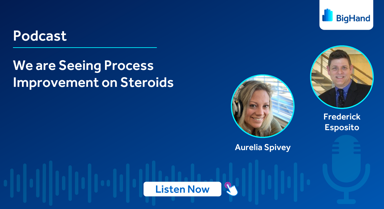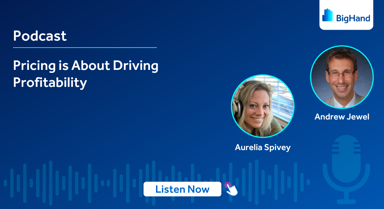Podcast Transcript:
Kevin Vaarsi
Pricing is strategic and it flows from and contributes to the overall strategy of the firm; how it generates profits, which businesses it chooses to enter, and how it plans to perform the work. And so I find that to be really fun, and it makes me feel like I'm really engaged with the business of the other firm.
Aurelia Spivey
Welcome to Pricing Matters, a podcast by Digitory Legal. Digitory is a data analytics and cost management platform and service, bringing data-driven pricing and cost prediction to law. My name is Aurelia Spivey, and I will be your host, as we speak to leaders who are making an impact in legal pricing, discuss market trends, and find out from them why pricing matters.
Our guest today is Kevin Vardy the Director of Pricing at Fenwick & West. Welcome, Kevin.
Kevin Vaarsi
Hi, Aurelia. Thanks for having me.
Aurelia Spivey
You're welcome, and so what I'd like to do is, is always start at the beginning. I think it's always helpful for our listeners to know what led you on your pricing journey and how you find your way to legal pricing. So why don't you tell us a little bit about that and what got you to where you are now?
Kevin Vaarsi
Sure. So my background is in finance, I have a degree in finance. When I got out of college I had a few different roles in finance and marketing and wound up in San Francisco in 2001 working at American Arbitration Association. I took on a business development role there and that was my first role in the legal world. I'd always had an interest in the law, my father was a lawyer, and it's something that we always discussed around the dinner table. So it was a match between my kind of business interests and my personal interests, and I really loved it. So that started what's now been an 18-year career working in the legal industry, first in American Arbitration Association, then in various local and international law firms. My focus for the first 10 or 11 years has been business development and along the way, one of my observations as a person focused on business development and marketing was that law firms oftentimes spoke about their expertise or their experience, but they didn't often speak about cost or price or value proposition and I thought there was a real opportunity for law firms to differentiate themselves by making that connection with clients. So around 2012, Fenwick & West had an opportunity for a role that would be really connecting those two areas of business development and pricing, and they had just formed a budget team, probably about a year or two before I joined, and they were doing a really nice job with profiling matters and creating budgets for the partners working on matters. What they were looking for was somebody to take all that information, and really package it up, make it accessible to the partners, try to see where there are patterns, where there were areas where we were doing similar scope, where we could create pricing packages for clients, and that's where my role started. So that's how I moved from business development in a law firm to pricing.
Aurelia Spivey
What drew you specifically more to that role at that time? Do you think?
Kevin Vaarsi
It's a few things. First of all, I saw the changes going on in the industry. Coming out of the Great Recession, we saw that clients were much more focused on the budgets and pricing for legal matters. The firm I had been working at had hired its first pricing director or pricing manager and I saw the importance of that. It was also somewhat of a frustration as a business developer, that it felt like there was something really missing from that communication, that value proposition and I really wanted to pursue that.
Aurelia Spivey
Fantastic, and I'd love to talk a little bit more about what we've been doing at Fenwick and as far as I understand, there's been a lot of focus on data analytics and cost management and it started in 2012. From my perspective, that was a very sort of market-leading thing to do. So can you tell us about that journey and data analytics and what you've learned in this data-driven approach, which, now you can't turn around, so talking about data. It would be great to hear from you about what you've been doing over the last number of years on that journey and what people can learn from that.
Kevin Vaarsi
Sure. So just to give a little bit more background on the team, since I joined the firm I took on our team, which is nine, nine members strong. And when we handle budget creation, monitoring, and alerting, we develop alternative fee arrangements for clients. We do legal project management and we do all the rate setting and negotiation for the firm. So we have a pretty wide mandate and we work with all the partners and many other attorneys and professionals for the firm. There are two major pieces to our data analytics strategy. So one is our matter-level data. So understanding the metadata that surrounds matters. If it's an M&A deal, what were the terms? What were what was the deal value? Things along those lines. So we track all that and we have a database for that. If it's litigation, what jurisdiction was it in? What was the issue at stake, and so forth? The second major piece is task coding. So when we first created our budget team, our first project was to go back and task code 10 years' worth of matter-level data and figure out what were the work streams that went into each matter. Then we had to take, when we create a budget, we take similar types of matters, so M&A with similar characteristics or litigation with similar characteristics, and we create a task-based budget. So we can show a client, here are 10 matters that are similar to yours, and here is historically what we've seen in terms of fees for different work streams and so we find that to be very effective in communicating fees to clients on budgets.
Aurelia Spivey
Fantastic, and what I'm hearing from this is that interaction with the clients. So my next question is, around this data-driven approach, what have you found has been the impact of working in this way for your firm?
Kevin Vaarsi
It's allowed us to have a really robust discussion with clients around the scope. Because once we lay out the different work streams for clients, we can then have a conversation about what the anticipated work is, who's going to do what tasks, are we going to have other third parties involved, and so the discussion becomes less about price and more about scope. And we found that to be a very effective way of communicating budgets to clients.
Aurelia Spivey
You know, some of the trends and challenges that pricing teams face, and we've heard a lot from corporate legal departments, legal ops, and procurement teams, that they really do actually have value in having the pricing team involved in the relationship. So can you tell us a little bit about how you're engaging with clients in the process in terms of scoping and anything else you can tell us about that?
Kevin Vaarsi
I think what we found is that it's important to have the right people, at the client, connected to the right people at Fenwick. So at the client, you've got general counsel or a CFO or legal operations people know we've got pricing analysts and we've got knowledge management people and practitioners as well. So when we're putting together a budget or pricing proposal we may want to be communicating with the people on the finance side to understand what are their needs. Are they focused on overall legal spending for the year? Are they focused on getting the best price for the specific matter? Are they focused on something else that we're not aware of? And once we have that communication, we can work with them on something that makes sense, and then along the way, we're also going to coordinate with our partners and our lawyers and the lawyers in-house at our clients to make sure that we're all aligned there. But I think everybody plays a role. We can take a lot of the work off the partners for things that they don't really need to be focused on and let them focus on the most important things, the strategy of the case, the scope of the matter, things along those lines, which they're uniquely positioned to do and let us focus on the finances.
Aurelia Spivey
When we looked at the pier monitor survey that came out recently that pricing teams come in different shapes and sizes. So the average size of the pricing team is sort of two to three people. Can you tell us a little bit about your team at Fenwick, and how your team is able to prioritize and make an impact with the partners and the business?
Kevin Vaarsi
Our team, first of all, our team specializes in different areas of the law. We have somebody focused on corporate matters, somebody focused on litigation, and another person focused on IP. And what that's done for us is allowed us to, first of all, build a lot of credibility with the partners we work with, because we really understand the matters that we're working on. It's allowed us to create more accurate budgets because we really understand the work. Our team has gained a reputation for just being really knowledgeable about the matters that we handle and that comes from a few different places. One is that just by reviewing time entries, on different matters, we get to know what the work is, it's just a part of the job, but we also spend a lot of time doing independent research, whether it's reading articles that our lawyers have published or just reading about how certain matters work. Then Fenwick does a lot of internal CLE programs, Continuing Legal Education, and our team makes an effort to attend those sessions because oftentimes, there are changes in the law that will impact how we create budgets. The number one thing we're focused on is making sure that for current matters, we have especially, the larger or more fee-sensitive matters, we're providing very accurate updates and regular updates to our partners and clients. That's one of our primary functions is to make sure that there are no surprises. So we do spend a lot of time at the outset of a matter making sure we've got a very accurate budget, given the information that we have. We spend time with our partners and clients understanding what type of updates do they require, what level of detail, and what level of frequency, and then we have an entire infrastructure in place to make sure that our clients and our partners are getting the updates that they need at the frequency they desire. We found that the one thing that clients just don't want is surprises. So our biggest mantra is no surprises, we want accurate, information communicated to everybody. So that's our top priority.
Aurelia Spivey
We can agree on the no-surprises elements and we've definitely seen that in the work that we do, the better communication you have with clients, the more effective the relationship. I wanted to sort of switch gears now to where we talked a bit about the teams and it's been a bit about Fenwick. Let's talk a little bit more about the trends across the industry that you're seeing. I think it's interesting to know, from your perspective, which practice areas are you seeing more alternative fees and why do you think that is?
Kevin Vaarsi
My view on alternative fee arrangements is that it's more likely to be utilized in areas that are either repeatable or process-oriented work. So you know, day to day, month to month, generally what to expect was easier for the firm to predict that or on a per matter or per task pricing bases, where you can manage the alternative fee arrangements as a portfolio. Whether that's litigation, M&A, or IP, having enough number of matters to understand that there'll be better outcomes on some than others, but overall, you can predict a fair price for them. That having been said, it is more difficult to come up with alternative fee arrangements for very large complex matters for the obvious reasons of the unpredictability and many different paths that things can take. So what we've seen is that the key there is just to think about what is predictable, what do we know is going to happen, so you can develop alternative fee arrangements for those pieces. But then, for the pieces that are less predictable, either do those hourly or figure out some other arrangement for those that build in the kind of risk involved. So yeah, I think it's less about practice area and more about what is certain, what can you predict, and what's not certain at that point.
Aurelia Spivey
You've come from a finance, and business development background, and there are so many different backgrounds that pricing professionals come into this role. What do you think are the most important skills that you need for the role and that new people can bring into this role?
Kevin Vaarsi
As you can imagine data analysis and Excel skills are obviously needed. We do a lot of work in Excel, we do a lot of work with data and financial information. It's definitely important to be able to understand that, you don't necessarily have to be, in order to be in pricing, an absolute expert in Excel, but you do need to be able to be very comfortable with manipulating and communicating data. So that's just sort of a first step. Something else I think is really important is good communication skills. One of the most important things is being able to probe and listen to when you whenever we are speaking with our lawyers, and get a really good understanding of the matter and the scope. And that requires asking a lot of questions, knowing which questions to ask, and then listening very intently. So that you really understand the dynamics of the matter. Writing skills are very important too, because one of the services we provide, as we often draft communications to clients, either for our lawyers or directly to clients explaining the budget, explaining changes, and so forth. And then along those lines, being able to translate the data in those spreadsheets. It's one thing to put together a task-based budget that shows these for the next two years, but it's another thing to be able to put that into a two to three-sentence summary so that people in different roles understand how that's going to impact them. What we've seen is that, depending on your role, in the matter, whether you're a partner at a firm, at our firm, where you're at the client, and you're the CFO, or you're at the client, you're the general counsel, the level of detail, and the type of communication that you want about the budget is going to be different. So we really need to be attuned to that. And then, I think just generally a curiosity and a desire to learn new areas. So those are the kind of important things I'd say is just data analysis, good communication, and a desire to learn and understand the matters that you're working on.
Aurelia Spivey
We talked a little bit already about how you engage with clients. In terms of fees or communication, what are you seeing the clients are asking most from your team or the team of people working with them at your firm?
Kevin Vaarsi
For us, it's really regular updates and for each client it's different. There are different flavors of it. Obviously, every corporation isn't completely different. It's important to sync with the internal financial mechanics of each company we deal with, right? Understanding how they do accruals, understanding what their budget cycle is, understanding who internally is making decisions, and what information are they using to make decisions. So for us, it's really learning, having good relationships with those people, and understanding what they need to get their job done, and when they need it, and then building our process around that.
Aurelia Spivey
I love that term, thanks to the financial mechanics. I think that's something that everyone listening to the podcast should keep in mind. Another question I have for you is you clearly have great relationships with clients, but we still sometimes see the challenge of the vague RFP coming out. How how does your team deal with that, if that happens to you?
Kevin Vaarsi
So what we've seen is, as the legal operations community has continued to grow and mature, we're seeing much less of that. I don't know if you've seen that the Corporate Legal Operations Consortium (CLOC), they recently started a law firm membership and so there's a very active engagement between the legal ops community and legal pricing community and other professionals on the law firm side. We're seeing less of that. All that being said, it is all about communication. We found that our clients are quite willing to engage with us in clarifying RFPs. We have a legal operations team at Fenwick that includes knowledge management, business development, IT, finance, diversity, and practice management, and so they review all of our RFPs and provide feedback. So to that extent, we do need clarification, we have a really great team of experts here who can pinpoint the areas that need further elaboration. So I feel like we've definitely seen it but I feel like we have a good line of communication with our clients. We can deal with it.
Aurelia Spivey
Fantastic, I like that sort of collaborative team approach on your legal upside. So, clearly, your team has been very successful in getting lawyer engagement, which can still be a common problem for pricing teams. Do you have any sort of on-the-ground tactics that you could give to our listeners for helping up the engagement with their lawyers? From the start? You know, when you're at the outset of pricing and agreements? How can people go about that in a technical way?
Kevin Vaarsi
So there are a few ways. So first of all, some clients just require that budgets are created, right? So through their E-billing systems, you need to give them a budget, in order for the matter to be built. So there is just a requirement that that is done. So those are easy opportunities to engage with the partners in the firm and say, hey, this is required, we need to do this, how can I help, right. And so my experience is that most partners would be more than willing to have us do the analysis and then review it, then have them do it on their own. Right? So that's something we're well suited to do. In general, I'd say, it's really important to speak their language, as I mentioned, our team's gotten a reputation for really understanding the work. If we're going to communicate with a partner, we want to really make sure we understand the dynamics of the matter and are able to speak their language. We also want to set them up for success. So we don't want to just, we try not to just send a spreadsheet, and have them interpret it, even though they're very capable of that, but that's just asking them to do the work. We try to send them the information, send them the data, but then also send a summary, or even better yet, summarize it in email communication to the client so that all they have to do is review it and send it if it's on point.
Aurelia Spivey
Given that our podcast is called Pricing Matters. I wanted to ask you from your perspective why does pricing matter to you?
Kevin Vaarsi
I think that pricing is one of the most fun and interesting areas for a few reasons. First of all, it's analytical. It's possible to use data to demonstrate value or to help with decision making and I just have a lot of interest in that. It's also psychological. Pricing isn't just about the data. Pricing and finances are very emotional issues for all parties and it can take some creativity and communication skills to be effective at it. So I think that's a fun challenge. And then, lastly, it's strategic. So pricing is strategic and that flows from and contributes to the overall strategy of the firm, how it generates profits, which businesses it chooses to enter, and how it plans to perform the work. I find that to be really fun, and it makes me feel like I'm really engaged with the business of the firm.
Aurelia Spivey
Fantastic, I love that answer. Is there anything that I haven't asked you that you'd like to share with our listeners that we haven't addressed yet?
Kevin Vaarsi
Thanks, Aurelia. I think all I'd like to say is just, I think that pricing is super important to the strategy of the firm. And so for anybody out there who is thinking about how to start with it at their firm, I would say just start. You've got to start somewhere. So either start with the data, start with creating alternative fee arrangements but start somewhere because this is really important and every firm needs to be doing this.
Aurelia Spivey
Thank you for listening to Pricing Matters, a podcast by Digitory Legal. To find out more about our guests. Please visit our podcast page at digitorylegal.com/pricingmatters. If you have any feedback or any guests that you think we should feature, please reach out to me. Thank you for listening. See you next time.






